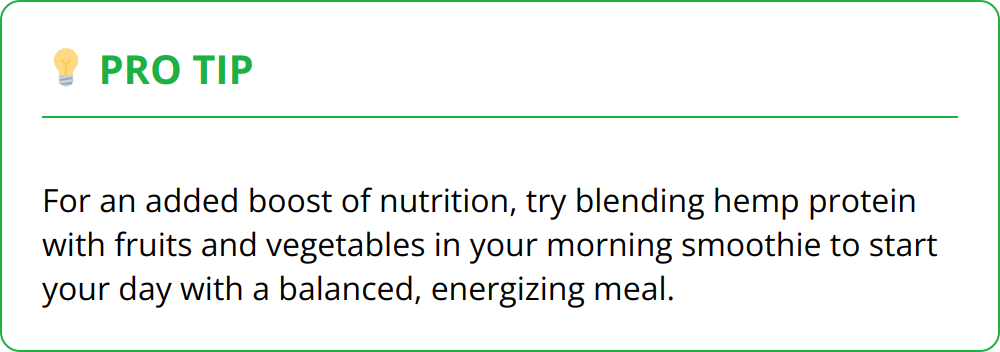We at Pure Hemp Essentials are excited to share the remarkable health benefits and nutritional value of hemp protein. This plant-based powerhouse is more than just a protein source—it’s a complete nutritional package. From muscle repair to heart health, hemp protein offers a wide range of advantages for anyone looking to improve their dietary habits. Let’s explore how it stands out from other plant proteins and why it should be a part of your daily nutrition.
Why Choose Hemp Protein?
When it comes to selecting a protein powder, one of the most significant choices you can make for your health and the environment is opting for hemp protein. This choice isn’t just about opting for a plant-based source but about selecting a nutritionally dense option that supports overall wellness and sustainable agriculture. Here’s a closer look at what sets hemp protein apart.
A Powerhouse of Nutrition
Hemp protein is celebrated for its well-rounded nutritional profile. It’s not just a good source of protein; it’s a nutritional powerhouse packed with essential fatty acids, dietary fiber, and a range of vitamins and minerals. Incorporating hemp protein into your diet is more than about meeting your protein needs; it’s about embracing a holistic approach to health.
The Protein Punch
Hemp protein offers around 15 grams of protein per serving, making it an excellent option for those looking to boost their intake, especially for vegans and vegetarians. Unlike many plant proteins, hemp provides all essential amino acids, making it a complete protein. This is vital for muscle repair, growth, and the synthesis of hormones and enzymes.
Fats for Heart Health
One of the unique aspects of hemp protein is its rich content of omega-3 and omega-6 fatty acids in a near-perfect ratio. These fats are crucial for cardiovascular health, reducing inflammation, and aiding in brain function. The presence of these healthy fats in a protein powder is a game-changer, offering benefits beyond muscle building and recovery.
Fiber and More
Hemp protein is also high in dietary fiber, which supports digestive health. Additionally, it’s packed with vitamins and minerals such as iron, magnesium, and potassium. These nutrients play essential roles in everything from oxygen transport and muscle function to maintaining fluid balance in the body.

Practical Tips for Incorporation
-
Add hemp protein to smoothies or homemade energy bars for a nutritional boost.
-
Use hemp protein as a flour substitute in baking to enrich your treats with protein and fiber.
-
Mix hemp protein into oatmeal or yogurt for a hearty and nutritious breakfast.
For more inspiration on using hemp protein in your daily routine, check out our guide on utilizing hemp seed oil.
In essence, choosing hemp protein is not just beneficial for your health, with its comprehensive array of nutrients, but also supports sustainable agriculture practices. Its nutritional profile, including the balance of protein, fats, and fiber, coupled with essential vitamins and minerals, makes hemp protein an excellent addition to a health-conscious lifestyle.

Why Add Hemp Protein?
Incorporating hemp protein into your diet offers various health benefits that extend beyond the gym. This powerful plant-based protein holds the potential to enhance muscle repair, boost heart health, and aid in digestive health and weight management. Diving into these aspects reveals how hemp protein can be a strategic addition to a balanced diet.
Boosting Muscle Repair and Growth
The body’s ability to repair and grow muscle fibers critically depends on the availability of all essential amino acids, which hemp protein abundantly provides. The quality of protein in your diet directly influences muscle recovery after workouts and supports growth. Hemp protein stands out because it supplies a complete amino acid profile, unlike many other plant-based proteins. To reap the benefits, consider incorporating a hemp protein shake post-exercise to fuel muscle recovery.
Supporting Heart Health
The unique ratio of omega-3 to omega-6 fatty acids found in hemp protein can significantly impact cardiovascular health. Regular consumption may help lower blood pressure, reduce cholesterol levels, and decrease the risk of heart diseases. These fatty acids also play a role in reducing inflammation throughout the body, including the cardiovascular system. Swapping out less healthy snacks for options enriched with hemp protein could contribute to a healthier heart over time.
Aiding Digestion and Weight Management
High dietary fiber content in hemp protein not only promotes digestive health but can also assist in weight management. Fiber aids in feeling fuller for longer, reducing the overall calorie intake. Additionally, a well-functioning digestive system is key to preventing bloating and discomfort, making hemp protein a beneficial choice for those looking to improve their digestion. Incorporating hemp protein into meals or snacks, especially in the morning, can ensure sustained energy levels and satiety throughout the day.

Here are practical tips for seamlessly integrating hemp protein into your diet:
-
Smoothie Bowls: Add a scoop of hemp protein to your morning smoothie bowl for an extra protein kick.
-
Protein Bars: Home-made protein bars with hemp protein can be excellent on-the-go snacks.
-
Baking: Substitute part of the flour with hemp protein in baking recipes for a nutritious twist.
These simple yet effective suggestions can help maximize the benefits of adding hemp protein to your dietary regimen. For those curious about enhancing their focus with the help of CBD, our guide on enhancing focus with CBD offers additional insights and recommendations.
By prioritizing hemp protein, individuals can support their body’s needs from muscle repair to heart health and digestive wellness, seamlessly blending nutrition with wellness objectives.
Hemp Versus Other Plant Proteins
Exploring the world of plant-based proteins reveals a broad spectrum of options, each with its unique properties and benefits. Among these, hemp protein stands out due to its comprehensive nutritional profile. When comparing hemp protein to other popular plant proteins like pea, soy, and rice proteins, it is essential to understand their differences to make an informed dietary choice.
Hemp and Pea Protein: A Nutritional Comparison
Pea protein has become a favorite for its high protein content and absence of allergenic ingredients commonly found in soy and whey proteins. However, hemp protein carries a secret weapon: its rich omega fatty acid content, something pea protein lacks. While both are good protein sources, hemp protein offers a broader range of essential nutrients, including omega-3 and omega-6 fatty acids crucial for heart health and anti-inflammatory responses. Additionally, hemp protein’s fiber content surpasses that of pea protein, making it a superior choice for digestive health.
The Battle with Soy Protein
Soy protein is one of the most popular plant proteins due to its complete amino acid profile, similar to hemp protein. However, hemp protein takes the lead in several areas. Firstly, it offers a better balance of omega-3 to omega-6 fatty acids compared to soy, which is higher in omega-6 fatty acids. This balance is essential for reducing inflammation and supporting heart health. Furthermore, hemp protein is naturally free from allergens and phytoestrogens found in soy, making it a safer choice for individuals with specific dietary sensitivities.
Comparing Hemp and Rice Protein
Rice protein is often chosen for its hypoallergenic properties and easy digestibility. However, it falls short in a few areas when compared to hemp protein. Unlike hemp protein, rice protein is not a complete protein as it lacks some essential amino acids. Hemp protein not only offers a complete amino acid profile but also boasts a higher fiber content and a range of fatty acids beneficial for cardiovascular health. Moreover, hemp’s nutrient density, including its vitamins and minerals, far surpasses that of rice protein, making it a more holistic nutritional choice.
Practical Tips:
-
For those prioritizing heart health, opting for hemp over pea protein can provide necessary omega fatty acids.
-
If you’re avoiding soy due to allergens or phytoestrogens, hemp protein is an excellent complete protein alternative.
-
Hemp protein’s nutritional density makes it a superior choice over rice protein, especially for those seeking a richer source of fiber and essential amino acids.
For individuals exploring nutritional supplements and interested in natural wellness trends, understanding the distinct benefits of natural wellness trends can further guide their choices in plant-based proteins.
In summary, while all plant proteins offer distinct advantages, hemp protein stands out for its unmatched blend of nutrients, including complete proteins, healthy fats, and dietary fiber. This makes it not just a protein supplement but a comprehensive addition to a health-conscious diet.
Final Thoughts
Hemp protein emerges as a nutritional champion, distinguishing itself from other plant proteins with its comprehensive benefits. Its unique combination of essential amino acids, omega fatty acids, dietary fibers, vitamins, and minerals makes it more than just a protein source—it’s a bridge to overall health and wellness. For anyone seeking to improve their dietary habits, hemp protein provides a versatile, nourishing option that supports muscle repair, heart health, and digestive wellness, which are integral to a balanced lifestyle.

Moreover, the environmental advantages of choosing hemp protein align with a sustainable approach to nutrition. By incorporating hemp protein into your daily diet, you’re not only nourishing your body with high-quality nutrients but also contributing to a healthier planet. From smoothie bowls to protein-enriched baked goods, the ways to integrate hemp protein into your meals and snacks are both simple and delicious.
We at Pure Hemp Essentials encourage you to consider hemp protein as a staple in your nutrition regimen. Its wide-ranging health benefits, combined with its environmental sustainability, make it an outstanding choice for anyone looking to enhance their health naturally. Explore our Pure Hemp Essentials collection, which includes a variety of wellness products, and discover how you can complement your diet with our high-quality options.
-
Promotes muscle repair and growth
-
Boosts heart health
-
Aids in digestive and weight management
-
Offers a complete nutritional profile
-
Supports sustainable agriculture
Incorporating hemp protein into your diet is an impactful step toward achieving a balance of nourishment and well-being. Start today, and witness the transformative effects of this plant-based powerhouse on your health journey.
